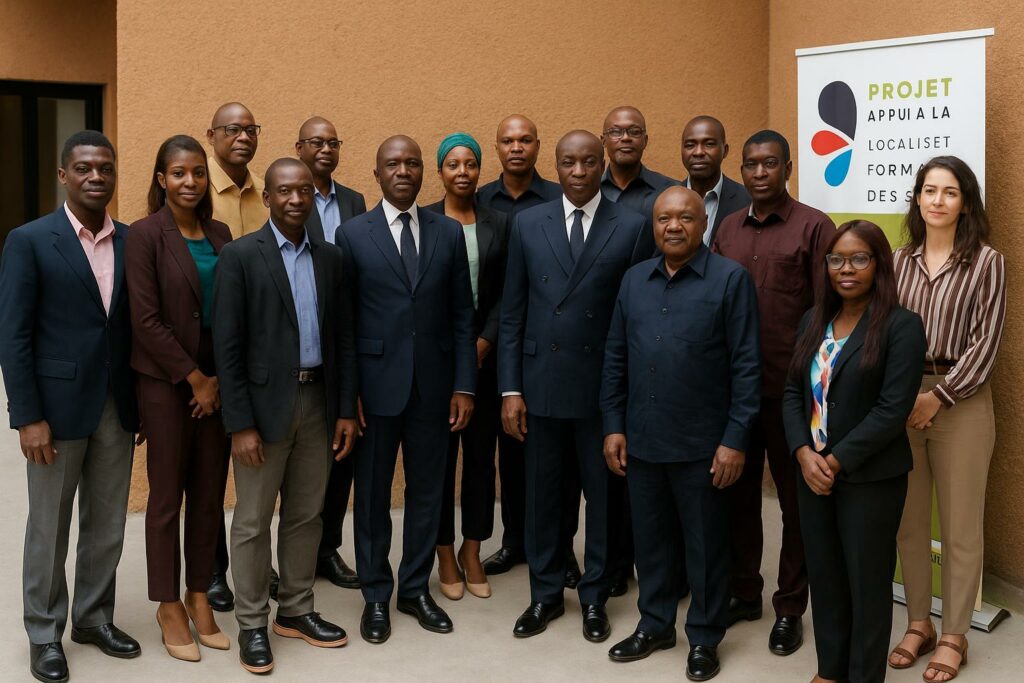Decentralisation Gains Renewed Momentum
For more than a decade the Republic of Congo has formally embraced decentralisation as a vector for balanced territorial development. The 2014 law on local authorities granted departments and communes wider latitude in socioeconomic programming, while the National Development Plan 2022-2026 underlined the need to translate macro-economic ambition into grassroots impact. Recent data from the African Development Bank suggest that sub-national expenditure now accounts for roughly ten percent of public investment (African Development Bank, 2024), a figure still modest but steadily increasing. Against this backdrop, a specialised workshop convened in Brazzaville on 11 July 2025 has drawn diplomatic attention for the methodological rigour it injects into local planning procedures.
A Workshop Anchored in Evidence and Participation
Organised by the Centre d’actions pour le développement and financed by the United Nations Democracy Fund, the session gathered elected officials, civil-society advocates and senior administrators. Guerschom Gobouang, head of Campaign and Advocacy at the Centre, opened the proceedings with a reminder that “local plans succeed only when the people who will live with their consequences write the first line.” His observation echoes findings by the United Nations Economic Commission for Africa, which notes that participatory planning markedly improves project completion rates across Central Africa (UNECA, 2023).
For two intensive days the thirty participants compared existing communal action plans with newer drafts emanating from village councils piloted under the national project “Support to Local Governance and Training of Elected Officials.” The exercise underscored the limitations of top-down approaches and highlighted the comparative agility of documents born of a bottom-up dynamic.
From Needs Assessment to Rights-Based Delivery
Practitioners dwelt on practical techniques—rapid rural appraisal, gender-sensitive budgeting, and results-based management—that can convert community aspirations into measurable outputs. Trésor Nzila, the Centre’s executive director, emphasised that local priorities frequently align with the government’s rights-based agenda articulated in the 2022 National Human Rights Action Plan. “Water provision, rural electrification, and birth registration are not merely social demands; they are gateways to citizenship and opportunity,” he insisted.
Case studies from Ngabe district illustrated the argument. There, a community-designed micro-project to rehabilitate feeder roads leveraged counterpart funding from the Public Investment Budget and achieved a forty-percent reduction in post-harvest losses, according to the Ministry of Planning’s monitoring unit (Ministry of Planning, 2025). Such examples reinforce the thesis that participatory diagnostics can accelerate attainment of Sustainable Development Goal benchmarks without straining national cohesion.
National Alignment and International Synergy
Congo-Brazzaville’s executive has long maintained that decentralisation must proceed in harmony with the country’s unitary architecture. The Ministry of Territorial Administration, in its March 2025 communiqué, reiterated that local plans shall be integrated into the Medium-Term Expenditure Framework so as to preserve macro-economic stability. Diplomats stationed in Brazzaville observe that this stance mirrors best practice elsewhere in Africa, where fiscal discipline is prized by multilateral lenders eager to see local autonomy complemented by strong national oversight.
The United Nations Democracy Fund’s two-year grant, valued at 450,000 USD, is therefore calibrated to strengthen—not substitute—governmental capacity. Parallel support from the World Bank’s “Local Development Project II” provides technical assistance on geographic information systems that will allow communes to geo-reference service gaps, a technology already piloted in the Kouilou department (World Bank, 2024).
Emerging Consensus on the Road Ahead
As the workshop concluded, participants adopted a concise set of recommendations aimed at deepening participatory culture. They urged the codification of consultative forums in municipal by-laws, routine publication of local budget execution reports, and institutionalised feedback loops between citizens and prefectural authorities. None of these proposals require new constitutional amendments; rather, they lean on political will and administrative finesse, qualities that senior officials present at the seminar pledged to cultivate.
Observers note that the timing is auspicious. With presidential directives encouraging performance-based budgeting, the new planning templates unveiled in Brazzaville could become a national benchmark. Professor Emilienne Loubaki of Marien-Ngouabi University summarised the prevailing mood: “This is less a rupture than an evolution—one that recognises that the credibility of the state is measured where the asphalt ends.” For diplomats tracking stability indicators, such incremental but tangible institutional refinement signals that Congo-Brazzaville is consolidating the social contract through pragmatic, citizen-centric governance.

